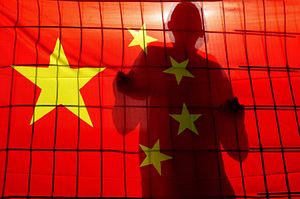A few China news links for your weekend reading:
China has detained a Swedish citizen for spreading “negative information about China,” particularly the country’s human rights situation. Peter Dahlin, 35, co-founded the Chinese Urgent Action Working Group, which helped train human rights lawyers and provided legal aid to Chinese citizens. According to a report in Xinhua, the group was “an illegal organization that sponsored activities jeopardizing China’s national security.” Police said the group was “unregistered” and received “unregulated huge sums of money” from overseas to destabilize China internally by creating false reports on the human rights situation and provoking “mass incidents.”
As has become standard practice for civil rights activists accused of illegal activities, Chinese state media aired a taped confession from Dahlin. The New York Times has details on the confession and how Dahlin’s case relates to a broader crackdown on human rights lawyers in China, which began last summer. A spokesman for the Chinese Urgent Action Working Group said the confession appeared to be “forced.”
Also in China domestic news, Chinese state media is highlighting the country’s water crisis. Xinhua details the impact of water pollution, which (though often overshadowed – literally – by China’s smog) may be the most pressing crisis facing the country. Some statistics from the report: “Nationwide, 27.2 percent of river water and 67.8 percent of lake water is undrinkable, according to the Ministry of Water Resources… Quality underground water was found in just 15.2 percent of tested areas.”
In cross-strait news, Taiwan was alarmed this week when the mainland’s state-run CCTV reported that a large-scale live-fire military drill had been conducted in Xiamen, just across the strait from Taiwan. It wasn’t so much the drill that was upsetting as the messaging, which some believed was designed to try to intimidate Taiwan after opposition politician Tsai Ing-wen won the presidential election on January 16. According to CNA, Taiwan’s Ministry of National Defense accused CCTV of using old footage to create an “exaggerated and false” report of a “routine military drill.”
In other news, the heads of the Chinese and U.S. navies conducted a scheduled video call on Tuesday; DefenseNews has the story. While maritime tensions – especially in the South China Sea – were on the agenda, Admirals John Richardson and Wu Shengli accentuated the positive. Both sides, for example, declared themselves “satisfied and encouraged” by the use of protocols to guide unplanned encounters at sea.
Fans of Chinese cinema in the United States should get ready: China’s smash hit Monster Hunt is being released in select theaters in the U.S. today. And, like many Hollywood films that show in China, the film will be tweaked for its overseas audience – namely, a scene that shows puppies for sale at a meat market is being scrapped, according to The Wrap. “We thought some of the scenes might take audiences here aback or confuse them, so they were cut in the dubbing process,” as one executive told The Wrap.
Finally, a reference that will keep you busy all weekend: the East-West Center has put together a comprehensive look at each U.S. presidential candidate’s Asia experience and policy views. If you want to see what Hillary Clinton, Ted Cruz, and Donald Trump have said about China, the South China Sea, and the U.S. rebalance to Asia (as well as a laundry list of other Asia-related topics), head there and start browsing.

































